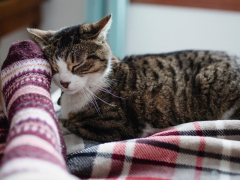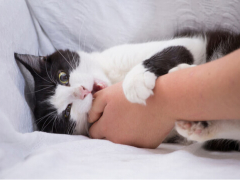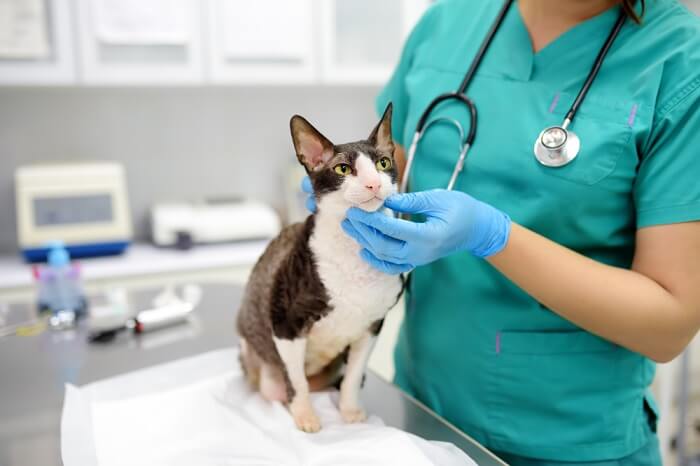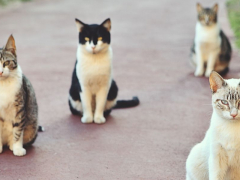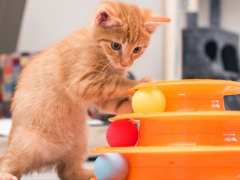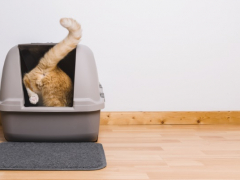This one week old kitten has just opened their eyes. Edmond Ohanes Santurdjian / Shutterstock
If you just got a new kitten, you may be wondering how quickly they age. Knowing the age of your kitten allows you to be sure they are developing appropriately and receiving the care they need at each important life stage—but it can be easier said than done.
This article will give you a comprehensive understanding of the physical and behavioral milestones that come with each week of a kitten’s life. We will also explain exactly how to care for a kitten at each stage: how often to feed them, weaning, socialization, veterinary care, and more.
Kitten Age Chart
Most newborn kittens are born at around 3.5 ounces and should gain weight at a relatively predictable rate until they are around 10 weeks old. If your kitten is in good body condition, this handy chart will give a rough estimate of their age based on the kitten’s weight and length.
While size is a good starting point when estimating a kitten’s age, there are important physical and developmental milestones that are even more accurate.
The Importance of Knowing Your Kitten’s Age
Kittens change rapidly in the first weeks of their life, as do their needs. If you’ve taken in a new kitten, it’s important to be able to age them accurately, so you know:
- If they’re developing as they should be
- What temperature to keep their environment
- How often they need feeding and when to wean them on to solid food
- How and when to start socialization
- When it is safe to administer flea and worm products
- When to take them for their first vaccinations
Even if you are raising a litter yourself, and know exactly how old your kittens are, understanding kitten milestones helps you give them everything you need. It will also help you spot any problems early.
Remember, if you have found an abandoned kitten, the first thing you should do is take them to a veterinarian for a full health check.
The Newborn Kitten
Newborn kittens are born with their eyes closed and their ears folded. Rudak Hanna / Shutterstock
When a kitten is first born their eyes will be closed and their ears folded over. They will still have an umbilical cord, which will gradually dry up and fall off about three to five days after birth. They don’t have any teeth yet.
Kittens are born unable to see, hear, or walk. They make sense of their new world through warmth, scent, and touch. This means that they are completely reliant on their mother (or foster carer) for all their needs. Newborn kittens need to feed from their mom roughly every two hours. Their mom will also help them go to the toilet by licking their perineal area after feeding.
Caring for a Newborn Kitten
If your newborn kitten is with their mom, you won’t need to do much if they are warm, fed, and toileted. They can’t regulate their body temperatures yet, so you should aim to keep them at around 90 degrees F.
In most cases, the best person to care for a newborn kitten is their mom. But, if a kitten is separated from their mom, she becomes unwell, or she has rejected them, you might need to step in. Becoming a foster mom is a big job! In the first week, kittens will need bottle-feeding kitten formula every two hours. You will also need to wipe under their tails (the perineum) with a moist cloth to help them pee and poo, and make sure they’re clean afterward.
It’s important to spot any kittens in the litter who aren’t developing normally. Kittens should double their birth weight in the first week. Weighing each kitten daily can be a good way to ensure they’re growing as they should.
One-Week-Old Kittens
By one week old, your kitten should have roughly doubled their birth weight. Their umbilical cord will have fallen off, but their eyes will probably still be closed. The eyes and ears usually begin to open this week and should be fully open by about two weeks old. Don’t worry if one eye opens first—that’s completely normal. They still won’t have any teeth showing yet.
At one week old your kitten will still spend most of their day sleeping. You might notice they are starting to wiggle around more in preparation for walking – and they will definitely be noisier!
Caring for a One-Week-Old Kitten
One-week-old kittens have similar needs to newborn kittens. They will need to feed from their mom (or bottle, if they’re being hand-reared) every 2-3 hours, and need help toileting. They still need to be kept warm, at about 80-90 degrees Fahrenheit.
Two-Week-Old Kittens
All kittens are born with baby blue eyes which will change to their adult eye color by 8-12 weeks. Natalia Kirsanova / Shutterstock
A lot will have changed as your kitten reaches their third week of life. While they will still have poor vision, your kitten’s eyes and ears are now fully open. All kittens are born with beautiful blue eyes, which gradually change to their adult eye color by about 8-12 weeks. Your kitten’s teeth won’t have come through yet, and their nails will still be intractable.
From two weeks, kittens become much more mobile, and most will even take their first wobbly steps. You might start to see the beginning of play, but they will still spend most of their time sleeping.
Caring for a Two-Week-Old Kitten
Two-week-old kittens should still be with their mom. They will be feeding every 3-4 hours now, but still need their perineum stimulated to go to the toilet. Their environment should be kept warm.
Kittens’ socialization period is from about two to seven weeks of age. Cats don’t naturally develop confidence being around people unless they have positive experiences with them during this period. So, from two weeks old it is important to gradually begin socializing your kitten with people, noises, and anything else they will encounter in their lives as adult cats.
Three-Week-Old Kittens
By three weeks, your kitten’s ears will be looking pointier. Their first teeth will be starting to come through at the front of the mouth, called incisors.
Their hearing and vision will be improving, and they will start to explore their surroundings more confidently. Kittens of this age will still sleep a lot of the time, interspersed with periods of playing and exploring. Although they are becoming rapidly more coordinated, they still won’t be able to run or chase quite yet.
Caring for a Three-Week-Old Kitten
At three weeks, feeds can be reduced to every 4-5 hours, and they may not need help toileting anymore. They will still need a heat source to ensure they’re warm when they are sleeping—approximately 75 degrees F.
You should give your kitten their first deworming treatment at three weeks old, and then every two weeks until they are sixteen weeks of age. You can use a roundworm-only wormer, as kittens rarely suffer from tapeworms unless they have fleas. But if you suspect fleas, choose a broad-spectrum dewormer and a kitten-safe flea treatment.
Now your kitten is becoming more curious, and beginning to toilet by themselves, it’s time to introduce a litter box. Choose one with a low opening and non-clumping litter—and be prepared for a mess. You can also offer some toys and scratching posts for them to play with. Remember to continue with gentle handling and socialization around a variety of people.
Four-Week-Old Kittens
At four weeks, kittens are starting to run, play, and explore their surroundings. Paula Ki / Shutterstock
Four-week-old kittens look much like three-week-old kittens, except that they will be moving around even more confidently, running and playing with their siblings. Their teeth will continue to grow, with the canines starting to show. They should now be able to retract their claws.
Caring for a Four-Week-Old Kitten
At four weeks old, kittens should still be with their mom full-time, with feeds every 4-5 hours (even overnight). However, you can now begin to offer solid food in addition to their milk feeds. This is called weaning. The food should be a special kitten diet, which is either wet food or kibble soaked to a gruel-like consistency. It’s best to use a flat dish that they can access easily. Be prepared for them to get very messy!
It’s important to keep weighing each kitten regularly when you start weaning to ensure they’re still gaining weight. Once you’ve started weaning, you can also make fresh water available. Just be sure to use a flat, shallow dish to prevent drowning.
Five-Week-Old Kittens
There aren’t huge physical differences between four and five weeks old, although you may see the beginnings of tiny teeth showing towards the back of their mouths. But there are big changes in your kitten’s behavior! By five weeks, they will be playing confidently, running, chasing, and even pouncing on siblings and toys. They’ll also be getting better at grooming themselves and using the litter box.
Caring for a Five-Week-Old Kitten
Although kittens should still be with their mom until 8 weeks old, they are starting to be more independent by five weeks. They no longer need a heat source where they sleep if the overall environment is above 70 degrees F. Five-week-old kittens should now be eating kitten food but should still be getting supplemental milk from their mom or the bottle roughly every six hours.
If your kitten had their first deworming treatment at three weeks of age, they will be due their next dose this week. Remember to continue de-worming them every two weeks until they are sixteen weeks of age.
Carry on gently exposing your kitten to new experiences. This kitten socialization chart from Cats Protection is a great starting point for ideas. Just remember to keep sessions short and stop if your kitten seems anxious.
Six-Week-Old Kittens
By six weeks, kittens are starting to hone their hunting skills. Milla Rasila / Shutterstock
By six weeks, your kitten’s back teeth (molars) will be showing, and their front teeth will have grown significantly. Their eyes will still be blue, although you might notice the beginnings of a change to their adult color. Your kitten will be playing confidently, honing their hunting and balancing skills. They may even be able to jump from small heights without toppling over. Most of them have mastered grooming by now.
If your kitten is with their mom, you’ll probably notice her choosing to spend more time away from them now, preparing them for independence.
Caring for a Six-Week-Old Kitten
Kittens move to eating just solid food around 6-7 weeks of age, although they may still want to suckle from their mom for comfort. If you’re hand-rearing, you can start to reduce bottle-feeds gradually from every six hours to stopping completely in the next week or two. Keep weighing them every few days to check they’re still gaining weight well.
If your kitten hasn’t yet had a visit to the veterinarian, this is a good time to get them checked over and to experience the cat carrier for the first time. They should receive their first set of kitten vaccinations between 6-8 weeks of age. Your veterinarian will recommend appropriate vaccinations depending on your kitten’s location and risk.
Seven-Week-Old Kittens
At seven weeks, your kitten will be looking much more grown up. Their eyes will nearly have changed completely to their adult color and all their baby teeth will have come through. If your kitten is a boy, their testicles may have descended as well – although they will be very tiny.
They will confidently be scaling the furniture and jumping from greater heights. Hopefully, they will be using the litter box well now.
Caring for a Seven-Week-Old Kitten
Seven-week-old kittens are very independent. They no longer need milk, getting all their nutrition from solid kitten food. It’s still best that they stay with their mom, if possible, until eight weeks old. But it’s normal for her to come and go as she pleases.
You can begin playing games with your kitten such as wiggling toys on a string or teaching them to come to their name for a treat. Carry on introducing them to as many new experiences as possible, including gradually introducing them to other pets, such as a quiet cat-friendly dog or an adult cat in a carrier.
Eight-Week-Old Kittens
At eight weeks old, your kitten will be a miniature version of their adult self. Their eyes will have changed completely to their adult color. All their baby teeth will be present. These typically fall out between 3-4 months and are replaced by permanent teeth by 6 months. If your kitten is male, you should be able to feel their testicles.
Your kitten will nearly have the agility and coordination of an adult cat—and they will be full of energy!
Caring for an Eight-Week-Old Kitten
Eight-week-old kittens are ready to leave their mom and can be treated much like an adult cat. They will be fully transitioned to kitten food, and you can add in dry kibble now if you’d like to. They should be fed 3-4 times a day.
If your kitten has not yet had a health check with a veterinarian, you should book them in now. They should receive their first vaccinations by eight weeks old and may be ready for their second if this was given at six weeks. Make sure they have been dewormed using an appropriate product and given flea treatment if there are any signs of fleas.
Once your eight-week-old kitten has been weaned, socialized, vaccinated, and treated against parasites, they are ready to go on to their new home—or begin their life with you as a fully independent cat!
-
Cats Protection. Socialization Chart. Accessed April 15, 2024.






